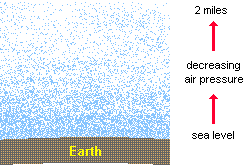It's a hassle to carry so many pounds of oxygen with you, but when you get really high on the mountain, even before you reach the top, your brain is oxygen starved because the air is so thin. So, where did the air go?
Professional hikers know that for every 1000 feet that you climb up, you lose about 3 1/2 degrees Fahrenheit. That's why carrying an extra sweater if you are climbing is very smart. The higher you go the colder the air becomes because the air is getting thinner and thinner...the molecules don't bump around creating heat...So where did the air go?
Okay! Okay! Air is matter and it has mass. If air is warmed it is less dense and tends to float upwards, but...air is also under the force of gravity. As the Earth spins in space, gravity is forcing air molecules toward the ground. Even though heat will cause air to rise, gravity pushes it down.
So air looks something like this in the atmosphere:
Or:
Since air has mass, pressure near the earth is greatest compared to the upper atmosphere where the pressure is not as great. At sea level air pressure pushes against the Earth at 14.7 pounds per square inch! That's why when you travel from sea level up to a high mountain your ears pop. Your eardrum is feeling that release of pressure and pops outward.
Some people need to wear earplugs or chew gum to help the eardrum pop. It can relieve some of the pain that comes with decreasing pressure in the ear, or increasing pressure in the ear when you travel off the mountain back to sea level.
The motion of the air molecules will change the pressure. If weather changes from sunny to breezy, those molecules are on the move and will cause short periods of low pressure or high pressure.
When air is heated and rises up, this causes a low pressure area. If a storm comes in and cooler air sinks to the ground this causes a high pressure area with rain, snow and all that weather stuff.
Watch this!
That's where the air goes! Are you surprised? Did you get the "air knocked out of you". Snicker, snicker...get it?







That is cool how when you go higher the molecules spread out. it is also cool how your ear popes in and out when you go up or down.
ReplyDeleteThis comment has been removed by the author.
ReplyDeleteSorry, something went wrong. I said that it's cool how your ears pop.
ReplyDelete